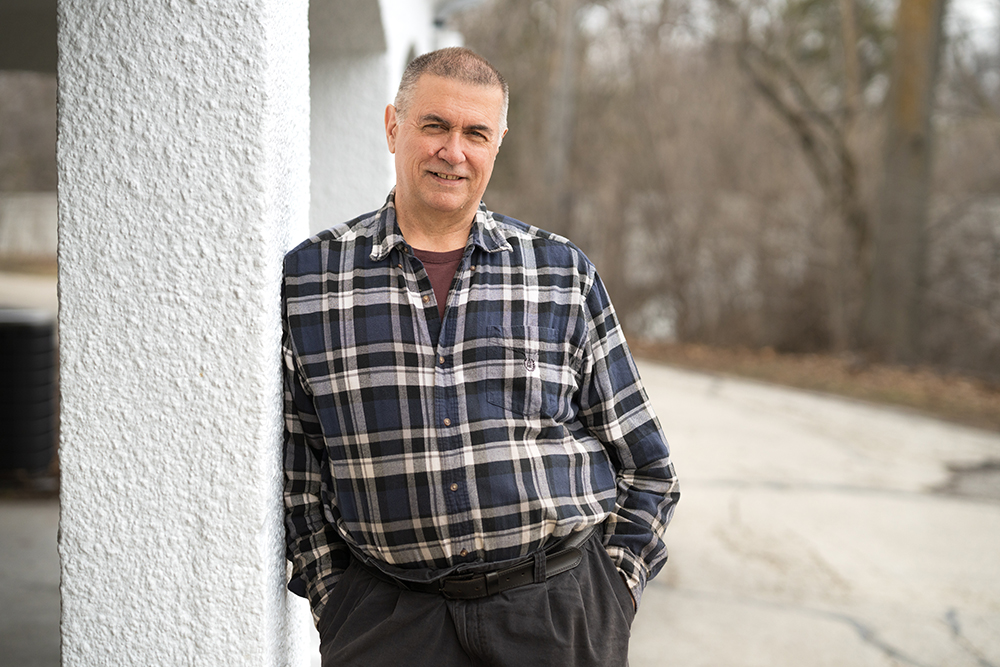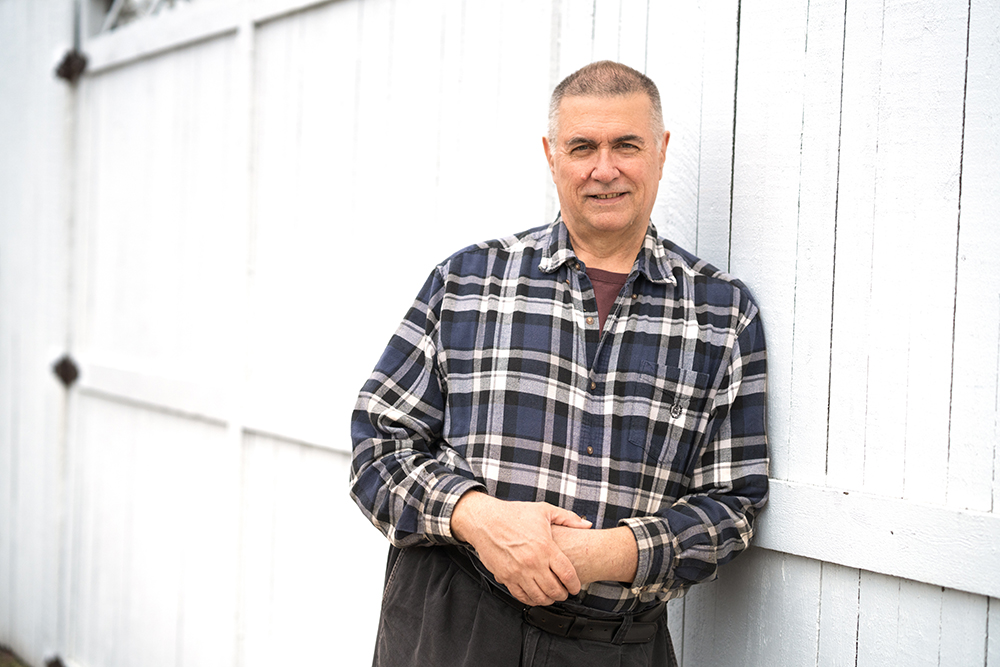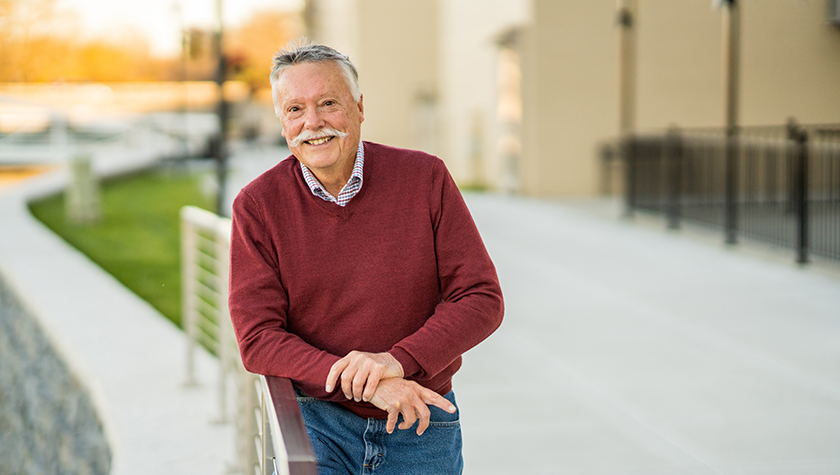
Alum Mark Putzi shares a multifaceted career traversing pharmacy, construction, and writing
By Jessica Steinhoff
Mark Putzi (PharmD ’11) has worn many hats in his career. It was a hardhat for the 35 years he spent running a construction business with his dad. He has also sported four different mortarboards and several thinking caps in his journey as a pharmacist and writer.
Putzi discovered his literary talents in high school, when a teacher told him he could write for a living. But he struggled to get published, so calling himself an author felt odd, even after earning a master’s in creative writing at the University of Wisconsin–Milwaukee in 1990.
“If you want to be a successful writer, you’ll want to completely destroy your ego,” he says with a chuckle. “I received so many rejection letters that I stopped trying to get published for over a decade.”
Putzi never stopped writing, and he learned to read his work with a critical eye. By 2004, he mustered the courage to seek publication again. Soon his poems started appearing in small-press magazines across the country.
At the time, he was back at UW–Milwaukee, studying biochemistry with the hope of boosting his earning potential. This path led him to the University of Wisconsin–Madison School of Pharmacy.
In pharmacy school, Putzi was active in Kappa Psi and forged relationships with faculty, who valued his perspective as a returning student. After graduating, he built a pharmacy career in Milwaukee, working at CVS, Shopko, Walgreens, and a handful of independent pharmacies. He kept writing, too.
Listening for characters
Putzi took a break from pharmacy in 2018, when an Achilles tendon tear forced him off his feet for eight months.
“I needed something to do, so I wrote a lot and started submitting my stories to publications outside the United States,” he says.
This tactic yielded more acceptance letters and a wider readership. Putzi has published upward of 30 stories in Europe, Australia, and India, as well as American journals such as Barzakh, Rougarou, and The Raven Review. He has also drafted a pair of novels and published two books of poetry, 2012’s Luck in Haphazard Calligraphy and 2020’s Dump: A Common Sense Interpretation of an American Presidency.

Putzi’s tales often come to him late at night, through characters that hijack his imagination.
“A few lines appear in my head, and if I think they’ll make an interesting voice for a character, I keep writing until that character is done saying what they need to say,” he says. “I ask myself what the character would think, which helps me focus and edit as I go.”
For instance, “Out of the Rain and Sun,” a story The AutoEthnographer published in 2021, centers on two men who look alike but think very differently. One blames himself for nearly everything while the other blames everyone else. The other-blamer punishes the self-blamer for a pathetic act, and then finds unexpected empathy for his victim. This story is one of Putzi’s favorites.
“It places its characters within the larger context of the environment that has created them, and lets them see, at the very end, just a fragment of light allowing each to view himself in perspective,” he says.
Putzi looks to Booker Prize-winner George Saunders for further examples of voice-driven stories. He also draws inspiration from literary titans such as Franz Kafka and Henrik Ibsen, as well as his wife, mystery writer Sharon Nagel, who publishes under the pseudonym Juneau Black.
Thick skin, tough asphalt
Putzi isn’t afraid to explore the human condition’s darkest corners. His stories about revenge and narcissism mine this territory for insights and draw readers into worlds vastly different from their own.
Sometimes readers assume Putzi shares his characters’ viewpoints and experiences, which has led to some awkward — and amusing — situations.
“When my character is a creepy, crummy guy, I want people to see a bit of themselves in him and maybe learn something,” he says. “It’s funny when they assume that character is me, so I try to take it as a compliment.”
This feedback also gives him a thick skin, a prized possession in both publishing and customer service. It has served him well in pharmacy, especially during turbulent times.
When Putzi’s pharmacy career hit a rough patch, his School of Pharmacy relationships proved invaluable as well. He’ll never forget how Karen Kopacek, associate professor in the Pharmacy Practice and Translational Research Division and associate dean of Student Affairs, helped him find his way.
“After the CVS I was working for closed, she assured me I’d find something else eventually,” he says.
“Meeting patients and discussing their medications with them, that was satisfying work for me, and managing a pharmacy isn’t that different from managing a construction crew.”
—Mark Putzi
Putzi’s passion for patient care and his leadership skills, many of which he honed as a construction foreman, guided his next steps.
“Meeting patients and discussing their medications with them, that was satisfying work for me, and managing a pharmacy isn’t that different from managing a construction crew,” he says.
Putzi also worked on the frontlines during the COVID-19 pandemic, administering thousands of vaccines to safeguard patient health. He also published several opinion pieces about public health in Madison’s Capital Times newspaper. Putzi’s pharmacy knowledge occasionally appears in his creative writing, too, but signs of his training tend to be subtle. When describing scenes and characters, he notices details others might miss and draws connections between disparate pieces of information.
Now retired from pharmacy, Putzi — when he’s not writing his next character — tests asphalt for a Milwaukee-based paving company’s materials lab. His pharmacy and biochemistry knowledge come in handy as he ensures the product meets durability requirements.

“Testing asphalt under controlled conditions is a big part of the job,” he says. “For example, we look at its ability to absorb a certain amount of pressure.”
Putzi also finds time to innovate. He and a friend have devised a new asphalt-testing method they think will save producers money. They hope to test it soon, through a grant from Putzi’s employer or a partnership with a professor at the University of Wisconsin–Platteville.
Meanwhile, Putzi is feeling less pressure in the publishing realm these days. Hearing “no” often — about 300 times for each “yes” he receives from American publications — is part of the dance, so he knows to expect it.
And when a “yes” arrives, it’s worth celebrating — ideally with a good book by Thomas Pychon, Grace Paley, Juan Rulfo, or another one of his favorite authors.
“I hope I can prove that high school teacher right, that I have what it takes to make it as a writer,” he says.
